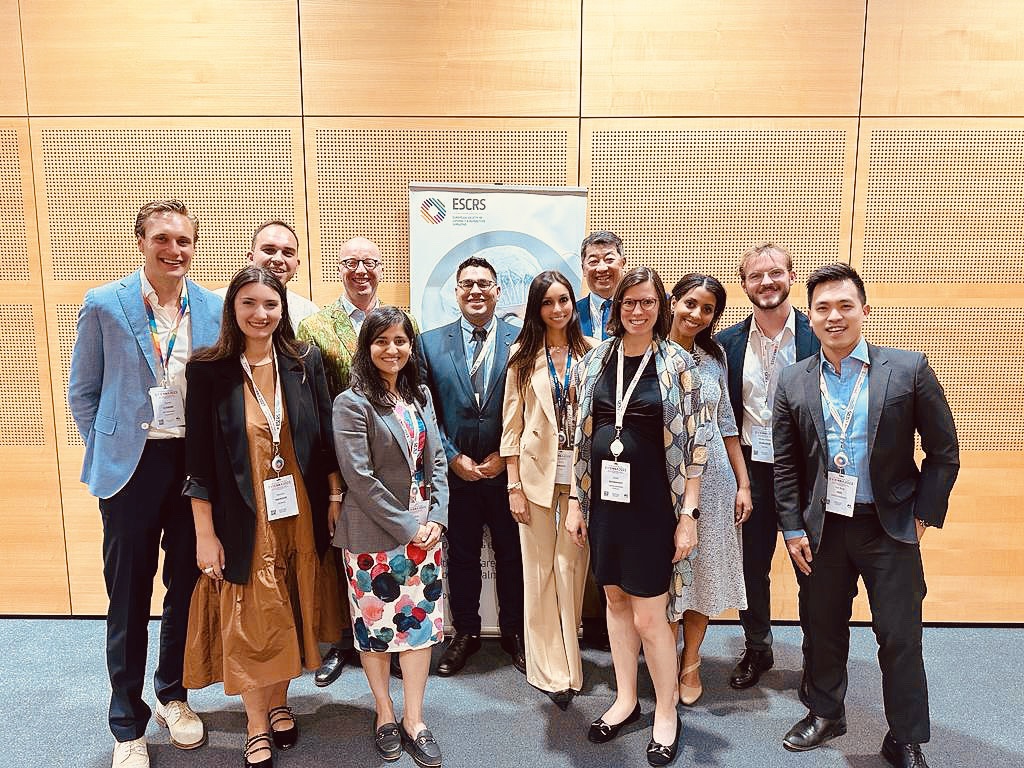ESCRS’ Young Ophthalmologists For Sustainability (YOFS)
Looking for lasting change? Right this way!
#StartNextMonday
A fresh lens was created by ESCRS Young Ophthalmologists For Sustainability (YOFS) to support Mission Zero and to raise the sustainability index of our daily clinical practice.
To ensure greater sustainability in operating theatres, we have developed 5 clear practices that can each have a vivid and positive impact without compromising patient safety. For the best effect, we suggest you focus on all of them and encourage your fellow surgeons to do the same.
1. Enable Ventilation 30 minutes Before Surgery
Instead of running OR ventilation continuously (during the night and on weekends), which wastes electricity and increases carbon emissions that intensify climate change, switch the ventilation off outside of office hours. Studies show that this offers equal infection control to continuous use. Discuss this with the infection control team of your hospital or surgical center.1,2,3
Read Article: Operating Room Energy Savings Through Air Treatment Modifications4

2. Use Disposable Medical Sponges Sparingly
If your hands are visibly dirty, a surgical scrub brush is the answer5 (needed before the first surgery of the day only). If they are not visibly dirty, studies show you don't need a brush to protect your patient from infection. An alcohol-based wash alone is sufficient6.

3. Replace the Full Body Drape with a Face Drape
Studies show that face drapes are as effective as the much more wasteful full-body drapes. 7, 8, 9, 10.

4. Cover Armrests with Your Gown
Separate armrest covers create extra waste - instead you may use your gown. In cataract surgery, your back does not need to be sterile as it does not come into contact with surfaces, medical staff, or the patient. Try to leave the gown open at the back while still standing and cover the armrests with it when you sit. The gown is wide enough to include the armrests, without risk of contamination to others.

5. Dispense with Eye Shields for Post-op Patients
Eye shields have no beneficial effect on post-operative recovery after uncomplicated cataract surgery. Not using a shield has become common practice in many facilities throughout Scandinavia and the Netherlands11.

In 2022, the Young Ophthalmologists for Sustainability (YOFS) was founded, consisting of aspiring ophthalmologists from 10 countries.
Their collective mission is to promote sustainability in the field of ophthalmology. The YOFS is an active and international team of young ophthalmologists associated with ESCRS.
Their primary focus is on devising and implementing initiatives geared towards enhancing sustainability within the field of ophthalmology. These initiatives revolve around waste reduction, research, education, advocacy, and fostering collaboration. The aim is to bring about lasting change in eye care provision for everyone in harmony with our planet.
For enquiries, please email: sustainability@office.escrs.org

Current YOFS Projects
- Waste Reduction: We conducted a European cataract package-analysis, recovering data from 44 different surgical centres spread across 12 different countries and nine different suppliers. From these findings a lowest common denominator cataract package has been constructed to give decision makers a first guideline on a more sustainable surgical practice, saving unnecessary single-use material. You can compare your own cataract pack to this ESCRS benchmark cat pack using the newly created SIDICS (Sustainability Index for Disposables in Cataract Surgery).
- A multinational survey on Practice pattern variation of pre-op and post-op visits across Europe. As travel is one of the main contributors to the carbon footprint of cataract surgery, we are interested in assessing the current practice patterns of cataract surgery's pre and postoperative visits (for uncomplicated cataract surgery) in a multinational way.
- A project in which we use the ESCRS' SIDICS calculator software to evaluate the carbon footprint of cataract surgery from various clinics across Europe. From an earlier YOFS research project, 43 hospitals shared their cataract pack information and based on this, the ESCRS' suggested sustainable cataract pack was calculated.
The aim of our current project is to present:
1. An estimate of the carbon footprint of disposables across Europe.
2. Which cat park items contributed most to the carbon footprint of a routine cataract surgery and how the results could help guide modification of future cat packs to be more in line with the sustainability goals. - Education: We organise sustainability sessions at the ESCRS and speak at various national conferences.
- Collaboration: We are tightly involved in EyeSustain to cooperate globally with other ophthalmic organisations and institutions.
- Advocacy: The #startnextmonday campaign was developed in 2023.

Main symposium ESCRS 2023: Making our surgery greener
Chaired by Oliver Findl and Rudy Nuijts, this conference session presentations included:
- Why does this matter? - Hugh Montgomery
- Frugal Innovation: lessons from low/middle income countries - Rengaraj Venkatesh
- Reducing OR Waste - Nicolas Winklmair
- Reuse and risk: what is the evidence? - David Chang
- What is industry doing? - Erin Powers
- Taking Action: What can I do now? - Sjoerd Elferink
Membership
FREE 5 year ESCRS Membership for trainees is available.
Please contact the Secretariat or click below for more information.

References:
- M. Dettenkofer et al. Shutting down operating theatre ventilation when the theatre is not in use: infection control and environmental aspects. Infect Control Hosp Epidemiol, 2003; 24:596-600A.
- Zarzycka Energy saving opportunities in operating theatres: a literature study. REHVA journal 2019
- Lans JLA, Mathijssen NMC, Bode A, van den Dobbelsteen JJ, van der Elst M, Luscuere PG. Operating room ventilation systems: recovery degree, cleanliness recovery rate and air change effectiveness in an ultra-clean area. J Hosp Infect. 2022 Apr;122:115-125. doi: 10.1016/j.jhin.2021.12.018. Epub 2021 Dec 30. Erratum in: J Hosp Infect. 2022 Nov;129:120. PMID: 34974079.
- Lans J, Traversari R, Brouwer A, Lako S. This article is a publication of iAM, further training concept for nurse anesthetists (November 2023). For more information, visit https://www.iamnaopleiding.nl.
- WHO Guidelines on Hand Hygiene in Health Care: First Global Patient Safety Challenge Clean Care Is Safer Care. 13.4.2 Use of brushes and number them accordingly.
- Javitt MJ et al. Association Between Eliminating Water from Surgical Hand Antisepsis at a Large Ophthalmic Surgical Hospital and Cost. JAMA Ophthalmol. 2020; 138: 382-386.
- Haripriya A et al. Changing operating room practices: the effect on postoperative endophthalmitis rates following cataract surgery .Br J Ophthalmol 2023: 780-785
- Winklmair N et al. Potential environmental impact of reducing the variation of disposable material used for cataract surgery. J Cataract and Refract Surg 2023: 49:628-634
- Chang DF et al. Survey of cataract surgeons’ and nurses’ attitudes toward operating room waste. J Cataract Refract Surg 2020; 46:933-940
- Chang DF et al. Survey report: survey of ESCRS members’ attitudes toward operating room waste. J Cataract Refract Surg 2023; 49: 341-347
- Lindfield et al. Shield or not to shield? Postoperative protection after modern cataract surgery. Eye 2011;25: 1659-1660